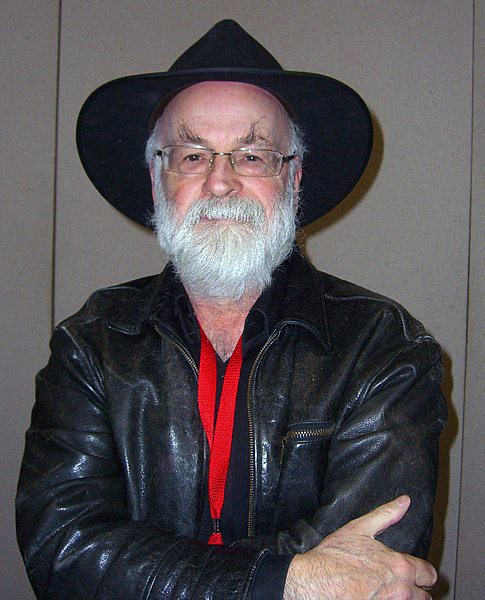My Love and Loss of Terry Pratchett

Terry Pratchett, known for the Discworld novels and a whole lot more. Writer of fantasy and sci-fi with a satirical bent.
Around January 2018, I settled down to read Maskerade, the 18th book in the Discworld series, and thoroughly enjoyed it. But it left me with a great deal of regret, because it’d taken me so long to get to it. It came out in 1995, and I did know about it in 1995, even, perhaps, wanted to read it, but there I was, 23 years later, only just getting onto it. What went wrong?
Without a doubt, Terry Pratchett is amongst the greatest influences on me of any writer. I devoured the Discworld books with a passion in my formative years. By the age of 12 I’d read every book in the series bar Maskerade, some multiple times (see Reaper Man, probably my most read book ever), and I’d even taken to writing my own Discworld stories. My only foray into fan fiction; that was curtailed by Pratchett himself when I wrote to let him know about it and he replied, “Great to hear you’ve written a Discworld book, even better to hear you’re writing your own books!”
I wasn’t sure then if I’d actually told him about my own books, or if that was a thinly veiled suggestion to back off. Such was Pratchett’s mastery with words. Nevertheless, wrapped in that response were some of the early lessons I took from him: it’s important to be original, and believe in yourself – and it’s okay to leave readers wondering.
I exchanged a couple of letters with Pratchett as a kid and three or four of his responses stuck with me forever. Of my idea to start producing t-shirts with his covers on them, he said he approved “as long as you don’t start a cottage industry”. And I must’ve bragged that I was a smart kid, because he advised me “don’t ever tell anyone how smart you are – act dumb and then surprise them.”
Now. Pratchett wrote truly creative and fantastical stories, while simultaneously twisting the ordinary into the absurd, using humour to undermine the epic and the dramatic. He also imbued values I’d happily live by myself: for one, he always answered his fan mail, even from annoying, arrogant kids. It would be hard to find a better role model.
But I shot myself in the foot.
I can’t pinpoint exactly when it happened (the last Discworld novel I read in my early years was was, I believe, Hogfather), but I’m blaming puberty. I began associating fantasy novels, and my love of Pratchett, with my childhood, and it no longer seemed The Done Thing. I don’t know that I actively dismissed reading fantasy, it just faded away all with my Warhammer collection – these weren’t mainstream activities, you indulged in fantasy with the curtains drawn and didn’t discuss it at parties. I’d see Pratchett and think, fondly, that was some good childhood reading. As an adult, I read about him, watched him on TV and even went to a Q&A with him. I cried when he passed away, feeling like I’d lost a dear friend. But I’d stopped reading his books long ago.
It was when I’d dived back into writing full time, specifically when my focus ran back to writing fantasy, that I happened upon a copy of Maskerade and realised this was where I left off. A nice blast from the past. Also short, a quick win for my TBR pile; hardback, a nice addition to the shelves; a bit of fun. As soon as I delved in, I realised what a fool I’d been. I remembered for the first time in decades that Pratchett hit all the right notes for me. This was exactly the sort of book I enjoyed. And I laughed – I couldn’t remember the last time a book made me properly laugh like that.
In the year and a half since, I’ve read more books by Pratchett than by any other author (most of whom I limit to two or three in a yearly period). And I’m happy I’ve got so much of his work still to enjoy, a passion rekindled. He was a truly masterful writer, and I owe a tremendous amount to him. In truth, he taught me to write, and to build worlds, and to strike a tone that could be both fun and meaningful, and I wish I’d remembered that sooner.

He is missed. I’m not a diehard fan, but I read somewhere that he was suffering from Alzheimer’s Disease in the midst of writing the late Discworld books. If that was true, his creative mastery soars beyond the cosmos.
Thank you for sharing Phil.
Yes, he became something of a spokesperson for the illness, and as far as I’m aware I don’t think he stopped writing until the very end (even when he physically couldn’t, he got around it!).